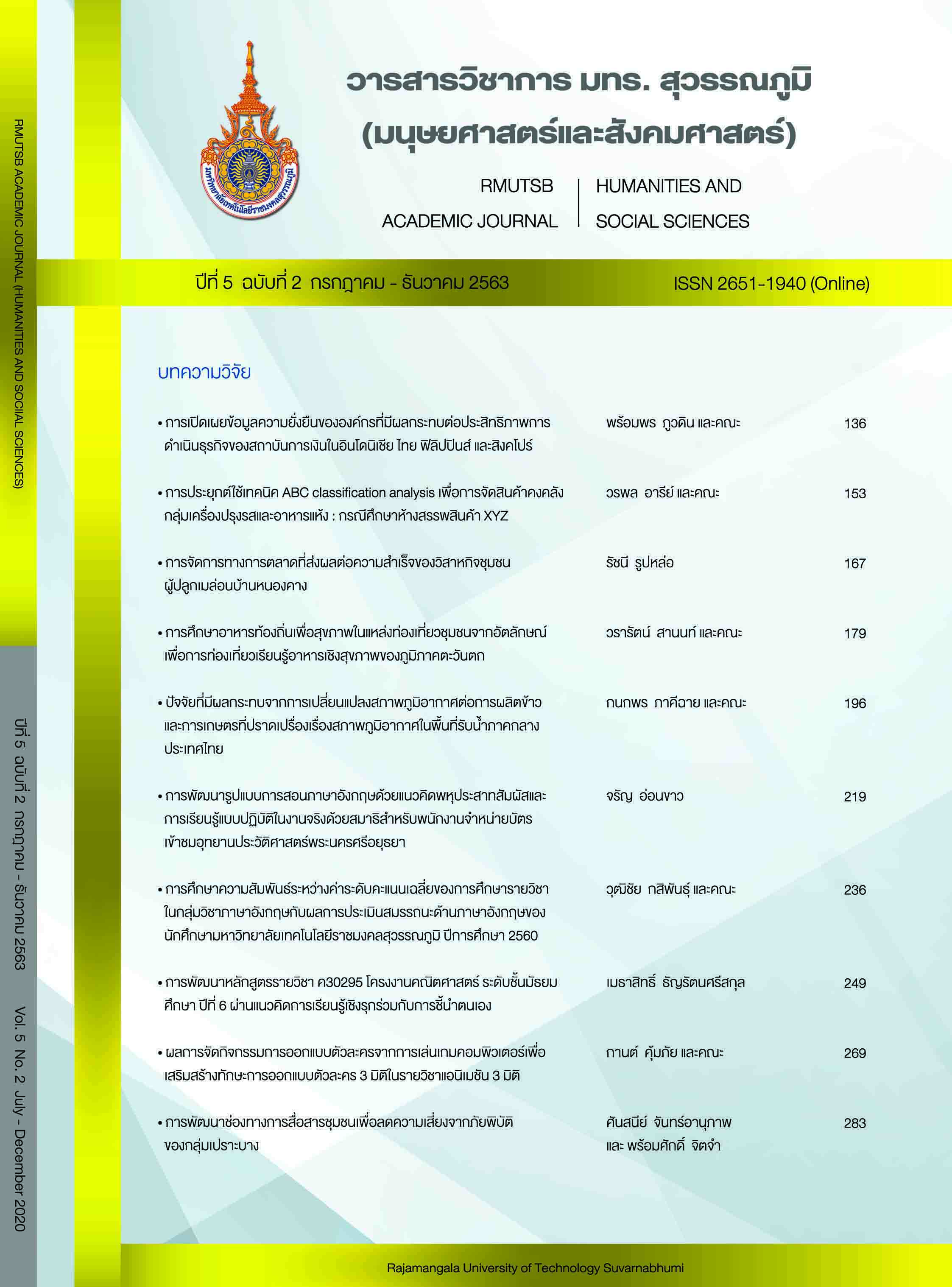Results of character design activities from playing computer games to enhance 3D character design skills in 3D animation courses
Main Article Content
Abstract
The purpose of this research were: 1) to compare 3D character design skills before and after the activities, 2) to assess the satisfaction with the character design activities from playing computer games. The population of the research was 19 students registered in the 3D animation course from Department of Animation and Digital Media, Faculty of Science and Technology, Bansomdejchaopraya Rajabhat University, 1st semester of 2019. The instruments used in the research were: (1) activity plans for 3D character design from playing computer games, (2) 3D character design skills test, (3) satisfaction assessment form which passed the instrument quality inspection with an index of consistency between 0.67-1.00. Statistics used in data analysis were mean, standard deviation and t-test.
The research results were as follows: 1) the design skills of 3D character were higher than that of before the study at the 0.05 level, 2) the satisfaction rating on character design activities from playing computer games to enhance 3D character design skills in 3D animation courses was at the highest level.
Article Details
References
Chatwattana, P. (2018). The synthesis of activity model using project-based learning of imagineering to enchance creative construction of multimedia skills and cooperative skills. Silpakorn University Journal, 38(1), 161-183. (in Thai)
Hiranoon, J. (2019). The development of training curriculum to enhance the 21th century learning skills for bachelor of science in technical education students. RMUTSB Academic Journal (Humanities and Social Sciences), 4(2), 220-231. (in Thai)
Kanchanakijsakul, C. (2018). Successful cessation process of online computer game addiction among Thai youth. Silpakorn University Journal, 38(2), 167-180. (in Thai)
Klinjan, C. (2017). A study on the achievement by using the creative process development of the course sound for multimedia technology. RMUTSB Academic Journal (Humanities and Social Sciences), 2(2), 149-157. (in Thai)
Kolb, D. A. (1984). Experiential learning: Experience as the source of learning and development. Englewood Cliffs, New Jersey: Prentice-Hall.
Kunaruck, N. (2013). Character design for animated film production in science fiction genre by Semiotics theory (Doctoral dissertation). Chulalongkorn University, Bangkok. (in Thai)
Office of Service Development and Promotion Department of International Trade Promotion. (2019). Gaming service business. Retrieved 5 November 2019, from https://www.ditp.go.th/ditp_web61/article_sub_view.php?filename=contents_attach/211771/211771.pdf&title=211771&cate=1128&d=0 (in Thai)
Patomchaiwat, W. (2016). More realistic Uncharted the lost legacy game launches on PS4. Retrieved 5 November 2019, from https://www.beartai.com/news/game-news/136725 (in Thai)
Pattaragorranan, N. (2017). The concept of the creative learning activities, learning from experience. Journal of Education, Silpakorn University, 15(1), 6-17. (in Thai)
Sookpatdhee, T. (2016). The concept graphic for communication. Valaya Alongkorn Review, 6(2), 163-180. (in Thai)
Supanan, S. (2016). 360 degrees leadership development classroom: The learning process of Bangkok University students in the 21st Century. Area Based Development Research Journal, 8(4), 35-52. (in Thai)
Supervisory Division Office of the Basic Education Commission. (2019). Supervision guidelines for development and promotion of active learning management. Retrieved 22 October 2018, from https://www.ubn1.go.th/post/view?id=389 (in Thai)
Thier, D. (2018). The game awards 2018: What time is it, how to stream and all nominees. Retrieved 22 October 2018, from https://www.forbes.com/sites/davidthier/2018/12/05/the-game-awards-2018-what-time-is-it-how-to-stream-and-all-nominees/#357ed55b35e8


